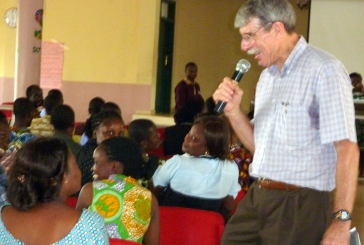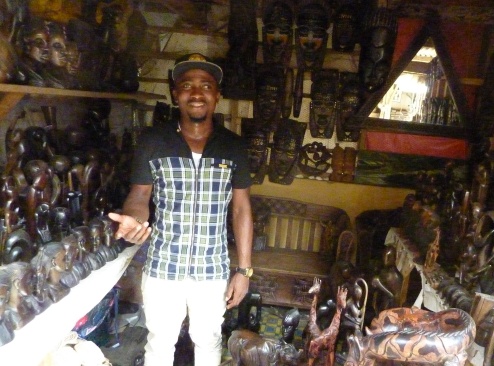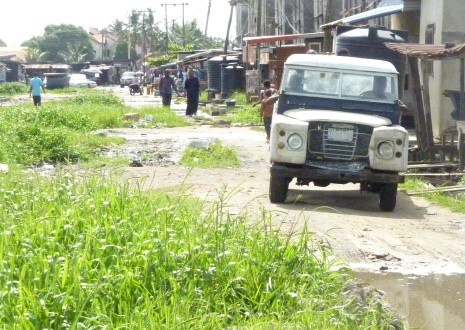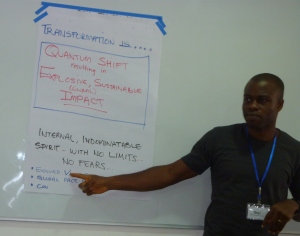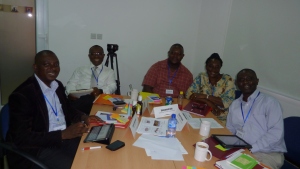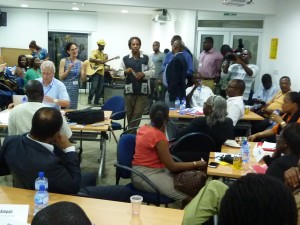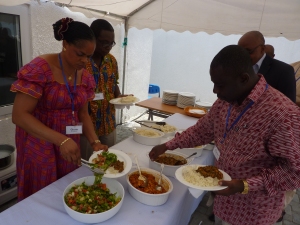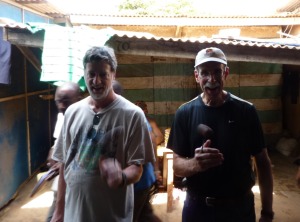I’m taking a little different approach to this post. I’ve heard that some prospective business coaches applying for the next group are reading the current coaches’ posts to get a senses of the experience.
This post speaks to my Friday visit to International Community School, one of my “transformer” companies. ICS is a private school with students from preschool to grade 12 in Kumasi (3 ½ drive by car but only a 35 minute plane flight from Accra) that has 1200 students. A number of each year’s graduates go on to top universities in the UK and US. The purpose of my visit was to run an exercise with ALL of the school staff while the school’s Director, Dr. Charles Yehoah, was in South Africa with a handful of students for a conference. The school provides boarding facilities for those students living outside of the Kumasi area.
Here are a couple pictures of the school’s beautiful campus:
I arrived at the Accra airport Friday around 9:30 for an 11:00 AM flight. They recommend that you arrive at the airport 2 hours early, even for local hops. Each business coach chooses their own style, but some have missed flights because they get caught in traffic so I tend to not try to cut it too close. In stead, I take work with me to fill the time. After checking my bag (the planes are small enough there is little room even for small luggage—my packed brief case barely fits in the overhead), I headed to the waiting room which is an air conditioned (sort of) tent. I walked around the tent to find the AC that seemed to be working the best.
One of the ICS employees met me at the Kumasi airport to drive me to the school. They also provided a ride to my hotel Friday evening and picked me up for an early morning flight back to Accra Saturday morning (I stayed overnight as the exercise would run late enough I could not be confident that I could catch the last flight Friday evening).
Interestingly, on the drive to the school I saw a number of taxis and trotros (small buses generally jammed with people) the police had pulled over. My driver explained that the weekend was coming so the police, wanting weekend spending money, were hitting up the taxis for “dash”—a payment of between 1 and 2 cedis ($.40 to $.80) in exchange for not getting a ticket. He also said the police don’t generally bother the private cars. Note to self, stick with private cars on Fridays, or one more reason not to cut the timing too short when going to catch a flight.
I arrived at the school before lunch time with time to kill before the 2:00 PM program was to begin. A typical Ghanaian lunch magically appeared, probably from the school cafeteria, of delicious fried rice (with as much hot sauce on the side as you wanted) and a couple pieces of chicken. The school’s IT guy stopped by to get my PC’s MAC address (what’s that all about?) to be able to give me access to the campus computer network and the internet.
The goal of this exercise, which was the last of 3 work sessions, was to engage the teaching staff and administrators, more than 60 people in total, to think about what it would take to make ICS “the best international school in Ghana in terms of value for money—providing quality education for less without compromising quality”. To achieve this would require a culture change. The staff was organized by student grade levels—preschool, primary, middle, high school and administration. During the 3 work sessions staff groups were to brainstorm ideas to achieve the goal and to report back at today’s session the 4 best ideas their department came up with to answer the following 4 questions:
- What will we do new?
- What will we do less of?
- What will we do more of?
- What changes will our team make to accomplish this?
Charles and I introduced the 3 phase plan when I visited the campus the week before—we began the brainstorming process at that meeting with the staff breaking into their education groups. Each staff group then met on their own mid-week, continuing the brainstorming but then narrowing the ideas to the 4 best for each question. After this second meeting, they emailed me their 4 best ideas for each question. Friday’s program was a presentation by each group to the entire staff with a group discussion of the ideas. Charles and I had agreed he would not participate in the Friday session to prevent the possibility that his presence could inhibit open discussion.
Obviously I was nervous—a non-educator leading a group of professional educators about how to improve education…and with the school’s Director in South Africa. .But as I’ve sub-titled this blog, this is my “stretch year”, and based on the emails I received of the ideas for each of the questions, the teachers were really into it. I told myself that my job was to facilitate.
After a slow start—US humor, or at least my humor, doesn’t always translate well to Ghanaians—we picked up momentum and midway through were having spirited discussions of well thought out ideas. As I mentioned above, the exercise was to kick off a process of culture change…and every presentation included a point on changing culture with many presentations including specific actions they would take. Here are a couple pictures from the day.
The room, while having air conditioning, was warm and combined with my nervousness resulted in this unflattering picture.
All in all, it was a personally rewarding and more importantly successful day givevn the purpose of the exercise. The big mistake I made was not having one of the staff from our Accra SEED office join me because they could have picked up many of the nuances of the discussion I missed because of poor acoustics and what my ear hears as an accent. Next time I’ll be smarter.
Here are a couple pictures of my Saturday morning drive to the airport which is typical of most major roads in Ghana–there are lined with shops selling all types of merchandise imaginable.
I was back in my apartment Saturday morning by 9:30 ready to begin thinking about this post.






